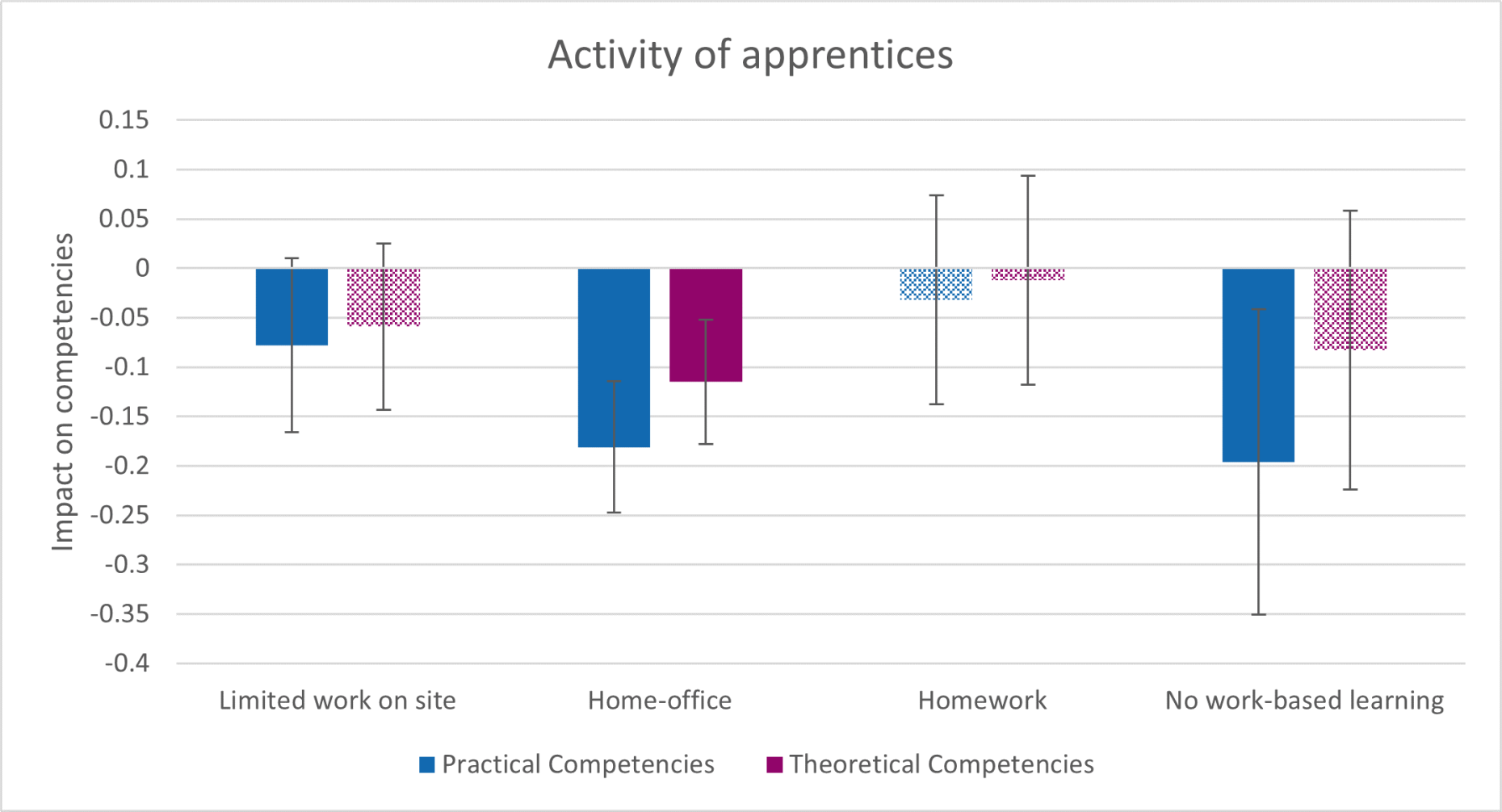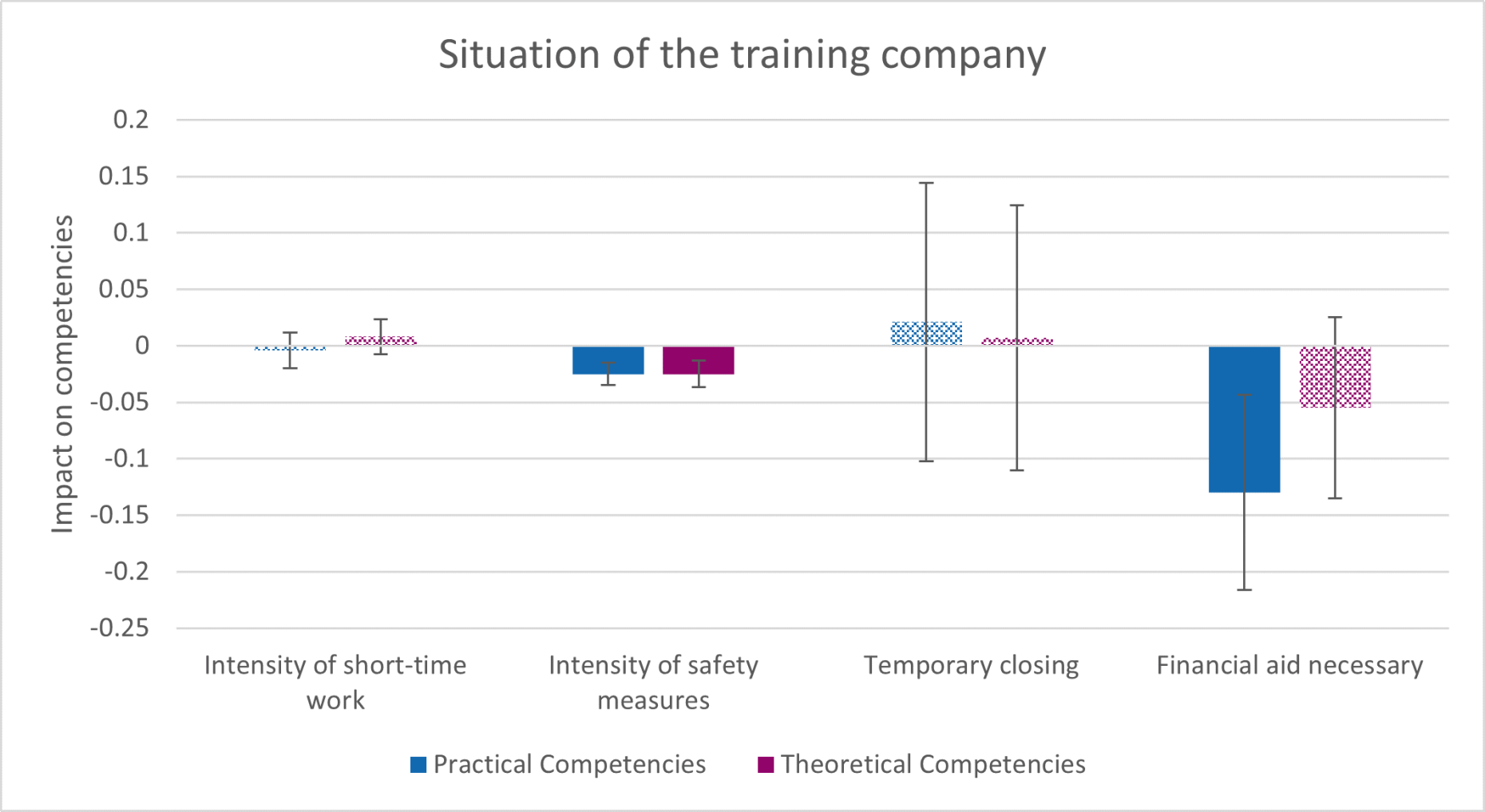Work-based learning and COVID-19 learning loss
Do students in work-based learning suffer less form learning loss than other students?
By Katie Caves and Amela Zubovic
We often get the question whether there is some evidence about students in worked-based learning and their learning loss due to time out of school and the training company. Do students in work-based learning suffer less form learning loss than other students? Can work-based learning help students to remediate lost learning faster? Unfortunately, we did not find any evidence in the existing literature that addresses these questions.
However, in our recent LehrstellenPuls (full report only in German) study we investigated the effects of the COVID-19 pandemic on the acquisition of theoretical and practical competences of Swiss apprentices. In this post we will present you the results from this study to give you some insights on how students in work-based learning are affected by the pandemic with regards to learning loss.
The study is written by our Apprenticeship Pulse team, led by Swiss Education Lab director Thomas Bolli. Its authors are Thomas Bolli, Katherine M. Caves, Filippo Pusterla, Ladina Rageth, Ursula Renold, Aranya Sritharan and Sandra Trachsel Díaz-Tejeiro. You can find more information about the Apprenticeship Pulse (in German and French) at external page this website.
In Switzerland most upper-secondary-level students choose vocational education and training (VET), and the vast majority of VET students are in dual VET where they learn at work and in school. During the first wave of the pandemic in April/May 2020, schools were shut down and apprentices received home-schooling. Depending on the occupation, company and region, apprentices’ vocational training was affected in different ways. While restrictions were quite relaxed during the summer months of 2020, measures were tightened again in October 2020 when the second wave hit.
To investigate the effects of the pandemic on apprentices and their vocational training, we have been collecting monthly data by handing out questionnaires to training companies since April 2020. Among other things, we have been also addressing the question of apprentices’ competency loss relative to normal conditions.
Competency Loss
First of all, do apprentices really suffer from learning loss due to the COVID-19 pandemic? According to training companies they do! Data from October 2020 – January 2021 reveal that the practical and theoretical competencies of apprentices have been negatively affected by the pandemic. Companies believe the impact on the theoretical competencies is stronger.
Channels affecting the competency loss
To identify how the pandemic is affecting the competency loss for apprentices, we gathered additional information about apprentices’ activities and quarantine experiences, plus data on how their training companies were affected. Figure 1 illustrates these three channels through which the pandemic could affect apprentices’ learning.
We start with the first channel, which looks at how the different training adaptations affected apprentices’ learning during the pandemic. Figure 2 displays the effects of different activities on apprentices’ practical and theoretical competencies. The blue bars display the effect on the practical competencies, and the pink ones visualize the effect on theoretical competencies. Darker colored areas stand for significant impacts on competencies, while the fainter ones are not significant.
Interestingly, when apprentices were working (or being schooled) from home, their practical and theoretical competencies suffered substantially. Furthermore, not being at the training company at all or only for a limited amount of time affected practical competencies negatively but had no effect on theoretical ones. Getting homework instead of in-company training did not have a significant impact on the acquisition of competencies. We also found that being in quarantine had a negative effect on both competency types, although this effect was very small (and is not displayed in the figure).
In Figure 3 you can see how the pandemic and associated changes in training companies affected apprentices’ competencies. Only the intensity of COVID-19-related safety measures had an impact on both practical and theoretical competencies. Also, when companies received financial aid, we see a substantial negative effect on the practical competencies.
Our results align with companies’ overall impressions. According to them, home-office (or home-schooling) is the main factor responsible for the loss of practical (45%) and theoretical (58%) competencies. Quarantine is believed to be accountable for one third of the competency loss.
Catching up on lost learning
How likely is it that the apprentices can catch up on the learning they have lost in the remaining time of their apprenticeship? Overall, companies do believe that apprentices will catch up a large part of the lost competencies, but there will still be some unrecovered losses. Moreover, it will be tougher to offset the lost theoretical competencies than the practical competencies. Interestingly, companies became more pessimistic over time, especially in the second wave. Not only did the competency loss accumulate, but it has also gotten more difficult to recover the learning.
We tested which channels had the biggest effect on apprentices’ ability to make up lost competencies. The largest obstacle by far for apprentices seems to be their absence from their training companies. Apprentices with periods of no training are the least likely to make up lost practical and theoretical competencies. Those doing homework, working from home, or working limited hours at the workplace are all less likely to make up lost practical competencies than those who worked normally during the pandemic. Training companies’ situations also matter for apprentices’ ability to make up learning loss, but to a much smaller extent: apprentices in companies with a lot of short-time work and with more safety measures are less likely to make up for lost competencies.
Conclusion
This study shows that the COVID-19 pandemic is driving learning loss for Swiss apprentices. Not only are the apprentices missing key learning opportunities, they are also having a more difficult time catching up.
Apprentices are worst off when they cannot train at the company. Reduced or non-existent workplace training both drive learning loss. Apprentices in companies that have to implement the strictest safety measures or that are at risk for bankruptcy are also more strongly affected than others. However, the strongest negative impact stems from working and learning at home. It is therefore important that apprentices receive optimal support and guidance when they are working from home.


